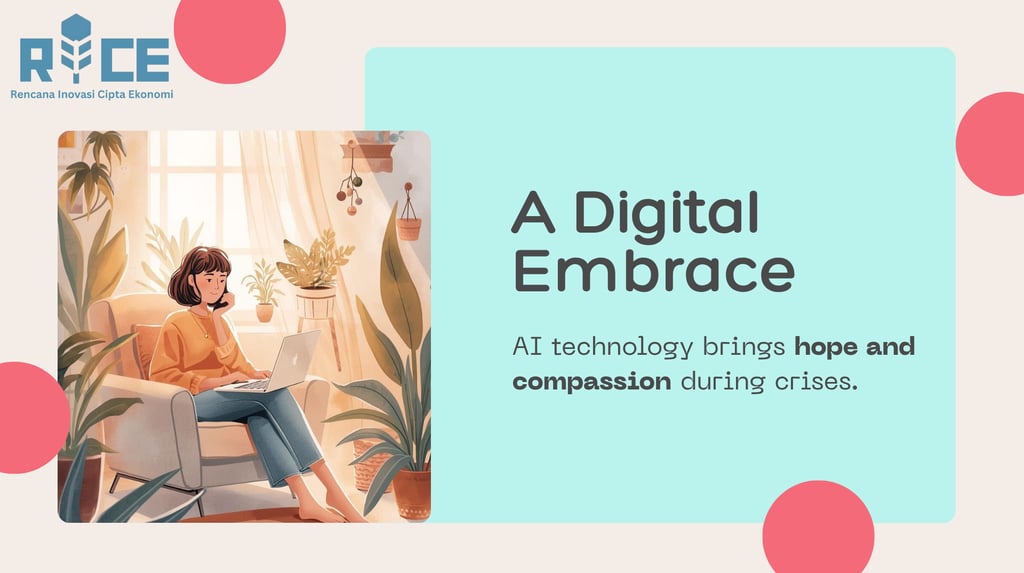A Digital Embrace: How AI Provided a Lifeline in Mental Health Crisis
Discover how AI is transforming mental health, offering a vital lifeline through accessible, personalized, and ethical solutions to bridge care gaps and augment human expertise.
INDUSTRIES
Rice AI (Ratna)
10/30/20257 min read


The escalating global mental health crisis presents an unprecedented challenge. With rising demand for support, persistent stigma, and a severe shortage of qualified professionals, traditional mental healthcare models often fall short. This dire situation has created a critical void, leaving countless individuals without timely or adequate assistance. In this landscape of urgent need, Artificial Intelligence (AI) has rapidly emerged not merely as a technological advancement, but as a vital lifeline, offering innovative solutions to bridge systemic gaps and provide critical support during moments of crisis.
AI's integration into mental health care represents a paradigm shift, promising enhanced accessibility, personalized interventions, and proactive support. From intelligent chatbots offering immediate emotional relief to sophisticated analytics predicting risk factors, AI is reshaping how we approach mental well-being. This exploration delves into the transformative role of AI, examining its diverse applications, tangible benefits, inherent challenges, and the ethical considerations crucial for its responsible deployment in nurturing mental resilience and delivering crucial assistance when it matters most.
The Growing Need for Accessible Mental Healthcare
Unprecedented Demand and Traditional Bottlenecks
The global prevalence of mental health conditions continues its upward trajectory, impacting individuals across all demographics and socioeconomic strata. Depression, anxiety disorders, and other psychological challenges are becoming increasingly common, placing immense pressure on already strained healthcare systems. This surge in demand is met by significant barriers that impede access to effective care, including prohibitive costs, geographical limitations, and a severe, widespread shortage of mental health professionals. Many communities, particularly in rural or underserved areas, lack sufficient resources, forcing individuals to endure long waiting lists or forgo essential treatment entirely. This creates a critical unmet need, exacerbating the impact of mental health crises.
AI as a Transformative Force
In response to these systemic limitations, artificial intelligence has rapidly positioned itself as a transformative force in mental healthcare. AI-powered tools offer scalability and round-the-clock availability, capabilities that human-centric systems struggle to match. These digital interventions can democratize access to support, reaching individuals who might otherwise remain unassisted due to logistical or financial constraints. By providing immediate, judgment-free interaction, AI addresses a crucial aspect of crisis intervention: timely engagement. This technological embrace holds the potential to significantly alleviate the burden on traditional services, offering a complementary pathway to support and recovery.
Innovative AI Applications Delivering Support
Intelligent Chatbots and Virtual Assistants
Perhaps the most recognized application of AI in mental health comes in the form of intelligent chatbots and virtual assistants. These conversational AI tools provide initial psychological support, acting as a first point of contact for individuals experiencing distress. They are designed to engage users in therapeutic conversations, employing techniques derived from cognitive behavioral therapy (CBT) and dialectical behavior therapy (DBT) to guide users through coping mechanisms, mindfulness exercises, and mood tracking. Their 24/7 availability ensures that support is always just a few taps away, offering a private and non-judgmental space for users to express themselves, track their emotional states, and access psychoeducational resources. This immediate, accessible intervention can be crucial in de-escalating moments of acute mental health crisis.
Predictive Analytics for Early Intervention
Beyond direct interaction, AI's analytical capabilities are proving invaluable in the realm of predictive mental health. Machine learning algorithms can process vast amounts of data—ranging from anonymized electronic health records to passive data from smartphone usage patterns and even social media interactions (with explicit consent and robust ethical frameworks)—to identify subtle indicators of deteriorating mental health. By recognizing patterns and anomalies, AI can predict an individual's risk of experiencing a mental health crisis, such as a depressive episode or suicidal ideation, before it escalates. This predictive power enables proactive intervention, allowing healthcare providers or support systems to reach out to individuals at risk, offering preventative care or early support. However, deploying such powerful tools necessitates stringent data privacy protocols and a profound commitment to ethical oversight to protect vulnerable populations.
Personalized Interventions and Digital Therapeutics
AI's capacity for personalization is revolutionizing how mental health support is delivered. Traditional "one-size-fits-all" approaches are increasingly being supplemented by AI-driven digital therapeutics that tailor interventions to an individual's specific needs, preferences, and progress. AI algorithms can analyze a user's engagement patterns, emotional responses, and reported symptoms to customize therapeutic exercises, recommend relevant content, or suggest specific coping strategies. This bespoke approach increases the relevance and effectiveness of the intervention, fostering greater engagement and better outcomes. Digital therapeutics, often delivered via smartphone apps, can track progress over time, adapt the therapeutic journey, and even integrate biofeedback mechanisms, making mental health support feel more responsive and aligned with the user's unique recovery path. These tools transform general guidance into a highly individualized journey towards well-being.
Measuring the Impact: Real-World Benefits
Enhancing Accessibility and Reducing Stigma
One of AI's most profound contributions to mental health is its ability to dramatically enhance accessibility to care. For individuals living in remote areas, those with mobility challenges, or those facing economic hardship, AI-powered tools eliminate many traditional barriers. The digital nature of these interventions means that mental health support can be accessed anytime, anywhere, requiring only an internet connection. This ubiquitous availability is particularly vital during a crisis, offering immediate recourse when conventional services might be hours or days away. Furthermore, interacting with an AI can circumvent the stigma often associated with seeking mental health support. The anonymity and privacy afforded by digital platforms encourage individuals to engage openly, reducing feelings of shame or judgment that might deter them from traditional therapeutic settings. This dual benefit of increased access and reduced stigma is crucial for fostering earlier intervention and broader engagement with mental well-being practices.
Augmenting Human Expertise
Contrary to fears of replacement, AI is predominantly augmenting the capabilities of human mental health professionals, not supplanting them. AI tools can handle routine tasks, provide initial screenings, and continuously monitor client progress, freeing up clinicians to focus on complex cases requiring deep empathy and nuanced judgment. For example, AI can analyze patient data to highlight potential risk factors or treatment non-adherence, providing clinicians with actionable insights that inform better care decisions. It can also assist in administrative burdens, such as scheduling or documentation, thereby increasing efficiency and allowing professionals to dedicate more time to direct patient care. In crisis situations, AI can serve as an invaluable first responder, stabilizing individuals and gathering crucial information that can then be seamlessly transitioned to human intervention. This collaborative model ensures that patients receive comprehensive care, benefiting from both technological efficiency and the irreplaceable human touch.
Responsible AI: Addressing Hurdles and Ensuring Ethical Deployment
Data Privacy and Security Imperatives
The deployment of AI in mental health necessitates rigorous attention to data privacy and security. Mental health data is profoundly sensitive, and its compromise could have devastating consequences for individuals. Robust encryption, anonymization techniques, and stringent access controls are not merely technical requirements but ethical imperatives. Organizations developing and utilizing AI for mental health must adhere to the highest standards of data protection, ensuring compliance with global regulations such as GDPR and HIPAA. Transparent policies regarding data collection, storage, and usage are essential to build and maintain user trust. Individuals must have clear consent mechanisms and control over their personal information, understanding precisely how their data is used to inform their care. Without these safeguards, the very tools designed to help could inadvertently cause harm, eroding confidence in digital mental health solutions.
Bias and Algorithmic Fairness
A significant challenge in AI development is the potential for bias within algorithms, particularly when systems are trained on non-representative datasets. If the data used to train mental health AI tools predominantly reflects certain demographics, cultural norms, or socioeconomic groups, the AI may fail to accurately understand or effectively support individuals from underrepresented communities. This algorithmic bias can lead to unequal access to care, misdiagnosis, or ineffective interventions for certain populations, exacerbating existing health disparities. Ensuring algorithmic fairness requires intentional efforts to source diverse and inclusive training data, coupled with ongoing auditing and validation of AI models. Developers must actively identify and mitigate biases, designing AI systems that are equitable, culturally sensitive, and capable of providing appropriate support across the full spectrum of human experience. This commitment to fairness is critical for AI to truly serve as a lifeline for all.
The Human Touch: Limits of Automation
Despite AI's impressive capabilities, it is crucial to acknowledge the inherent limits of automation in the deeply human realm of mental health. While AI can simulate empathy and deliver structured therapeutic content, it cannot replicate the nuanced understanding, authentic connection, and profound emotional intelligence that a human therapist provides. The therapeutic alliance—the bond of trust and collaboration between a client and their therapist—is a cornerstone of effective mental health treatment, a dimension currently beyond AI's grasp. AI tools are best viewed as sophisticated aids and supplements to human care, not as replacements. They can provide initial support, track progress, and offer resources, but complex trauma, intricate emotional dynamics, and profound existential questions often require the unique capacity for compassion, intuition, and ethical reasoning that only a human can offer. The most effective future for mental healthcare will undoubtedly be a collaborative one, where AI empowers and extends human clinicians rather than diminishes their indispensable role.
The Future of Mental Healthcare: A Collaborative AI-Human Ecosystem
The journey towards leveraging AI as a consistent lifeline in mental health is still evolving, yet its profound impact is already undeniable. We have seen how artificial intelligence moves beyond mere automation to offer personalized, accessible, and often immediate support, fundamentally transforming the landscape of mental healthcare. From providing a discreet, ever-present ear through intelligent chatbots during moments of distress to proactively identifying risk factors with predictive analytics, AI has demonstrably extended the reach of mental health services, particularly for those who have traditionally been underserved. It offers a crucial first line of defense, a scalable solution that can stabilize individuals and guide them toward further help, serving as a vital bridge in crisis situations.
The promise of AI in this critical domain lies not in replacing human interaction, but in fostering a powerful synergy between technology and human expertise. Envision a future where AI acts as a sophisticated co-pilot for clinicians, handling routine data analysis, monitoring subtle changes in patient behavior, and suggesting evidence-based interventions, thereby freeing up human therapists to focus on the deeply empathetic and complex therapeutic relationships that are irreplaceable. This collaborative ecosystem will allow for earlier detection, more personalized treatment plans, and continuous support that adapts to an individual's evolving needs.
However, realizing this promising future demands unwavering commitment to ethical development and responsible deployment. Addressing challenges such as data privacy, algorithmic bias, and ensuring robust security measures is paramount. We must collectively ensure that AI tools are designed with fairness, transparency, and user well-being at their core, building public trust and mitigating potential harms. Continued research into the efficacy, accessibility, and ethical implications of AI in mental health is essential to refine these tools and integrate them effectively into broader public health strategies.
The digital embrace of AI offers more than just technological advancement; it provides a real, tangible lifeline in the ongoing mental health crisis. It empowers individuals, augments professionals, and promises a more resilient, accessible, and responsive mental healthcare system for all.
Explore how digital innovations are shaping accessible care, and consider integrating these cutting-edge tools into broader public health initiatives. Engaging with the evolving landscape of AI in mental health is not just about technology; it's about fostering a more supportive and responsive future for well-being.
#AIMentalHealth #DigitalTherapeutics #MentalHealthCrisis #AIinHealthcare #Telehealth #MentalWellness #ArtificialIntelligence #HealthcareInnovation #EthicalAI #DigitalMentalHealth #PsychTech #FutureOfHealthcare #CrisisSupport #HealthTech #Wellbeing #DailyAIIndustry
RICE AI Consultant
To be the most trusted partner in digital transformation and AI innovation, helping organizations grow sustainably and create a better future.
Connect with us
Email: consultant@riceai.net
+62 822-2154-2090 (Marketing)
© 2025. All rights reserved.


+62 851-1748-1134 (Office)
IG: @riceai.consultant
